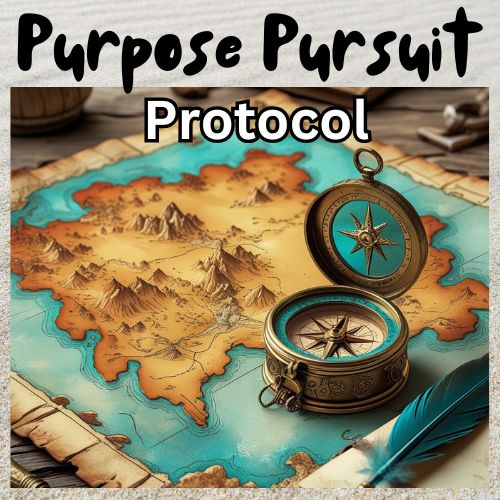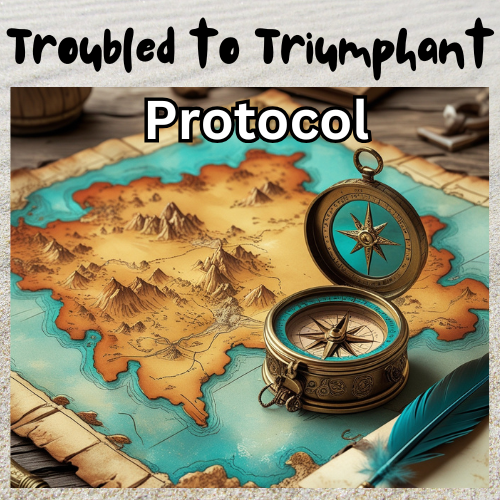The Compass That Points Inward
Armand had carried the compass for forty years, but until today, he’d never realised it had been pointing the wrong direction all along.
A Compass becomes a Catalyst
Yesterday, we met two souls beginning a journey that would challenge everything they believed about life after 50. Today, as they walk from Manciet toward Nogaro, a discovered compass becomes the catalyst for questioning what we’re really meant to do with our lives – and why most of us have been following the wrong magnetic north.
What if I told you that the most dangerous lie we tell ourselves isn’t about our limitations, but about our possibilities? That we spend decades following a compass that points toward “should” instead of “soul”? Today’s story will challenge everything you think you know about finding your purpose – especially the part where you think it’s too late to find it.
Chapter 2: A Drawer marked “Someday.”
The brass compass sat heavy in Sophie’s palm, warmer than she’d expected, as though it still remembered the hand that used to hold it. They had just finished their less-than-legendary breakfast—a sad, crumbling granola bar that cost roughly the GDP of a small nation and coffee so acidic it could have powered jet engines – overpriced, underwhelming, and possibly life-threatening.
The inscription on the back was simple, almost stubborn in its earnestness:
To Armand – Follow your true north. Love, Grand-père Henri, 1984.
Armand’s voice, when it came, carried the brittle edges of forty years of regret. “It was my eighteenth birthday gift,” he said, not meeting her eye. “My grandfather was a cartographer. An explorer. He mapped parts of Algeria no one had charted before. He wanted me to carry on his legacy.”
Sophie turned the compass over, feeling the indentations of the engraving under her thumb. “But you became an engineer instead.”
It wasn’t a question. She recognised that particular cadence, the apologetic confession of a life lived to make other people comfortable.
Armand’s laugh was short and sharp, bitter enough to corrode their tin cup of coffee. “Practical parents. Practical choice. Steady income, good pension, social approval. I put the compass in a drawer and promised myself I’d explore ‘someday.’” He glanced skyward, watching a hawk spiral above the mist-wrapped Gascon hills with a longing that bordered on physical pain. “Someday turned into forty years of CAD diagrams and meetings where the most thrilling moment was a three-hour argument about bolt tension tolerances.”
Sophie winced in solidarity. She knew that particular flavour of regret—the slow suffocation of youthful dreams, neatly pressed under the heavy fabric of what everyone else called ‘sensible choices.’
They trudged on, the morning mist clinging to the hills and to them, as if reluctant to let them go. The path narrowed into a slippery mud-slick, the kind that seemed custom-designed to test their endurance, patience, and dignity.
“I wanted to be a travel writer,” Sophie said, her voice almost lost in the hush of the mist. “I was accepted to a journalism program when I was eighteen. I kept the letter pinned above my desk for three whole days.”
“Three days?” Armand shot her a sidelong glance.
“Before my parents’ voices got louder than my own. ‘Writing isn’t a real career, Sophie. Marketing is stable. Think of your future.’”
She skidded slightly on a patch of mud, arms flailing, but recovered her balance, just in time. Armand raised an eyebrow but mercifully said nothing.
The irony nipped at her like a persistent gnat: she’d spent her entire adult life selling dreams she never dared to chase herself. Brochures, commercials, digital campaigns—all shouting at potential clients: You deserve this!
The one person she’d never tried to sell that story to was herself.
“I used to write stories,” she confessed, steadying herself on a gnarled walking stick as the path tilted again. “About places I’d never been. About people braver than I was.”
“What stopped you?” Armand asked. Then, before she could answer, he waved a hand. “Wait, no, let me guess: fear, but disguised as caution?”
She stopped walking and stared at him, a breath caught somewhere between annoyance and admiration. “Do you have some secret mind-reading side gig I should know about?”
“We all have an inner compass,” he said with a shrug. “Most of us just forgot how to read it.”
They hiked in companionable silence, their footfalls softened by the damp earth, until Armand pointed to an ancient stone marker up ahead, its surface worn by centuries of wind and pilgrims’ hands.
“Look at that. Eight hundred years old, maybe more. Still standing, still pointing the way.”
Sophie traced the weathered grooves with her fingertips. “Why did we stop chasing our own destinies?”
Armand exhaled slowly, his breath fogging in the cool air. “When we started believing dreams came with expiration dates. When we let other people’s caution deafen our compass. When we convinced ourselves that practical and purposeful were the same thing.”
A group of twenty-somethings breezed past them, their backpacks practically bouncing, their chatter light and unburdened, as if they’d never even heard of regret. Sophie watched them go, feeling a twist in her gut that might’ve been envy or might’ve been something closer to hope.
“They make it look so easy,” she muttered.
“Maybe because no one’s taught them how to complicate it yet,” Armand said, his mouth quirking into a grin. “Maybe they still think the compass points to possibility, not security. They haven’t been told yet that really wanting something more is selfish.”
Sophie absorbed that as they walked on, the rhythm of their steps syncing in a quiet, unspoken cadence.
“You know what’s funny?” she said eventually. “I spent twenty-five years in marketing convincing people they deserved to follow their dreams. Buy this car, book that holiday, wear this perfume—because you’re worth it, right? But the only person I never managed to sell that dream to was myself.”
Armand’s grin widened. “The cobbler’s children have no shoes.”
“In our case, the dream-seller has no dreams.”
Their laughter echoed down the empty path, startling a pair of drowsy pigeons into flight. Sophie realised, as her chest unknotted just a little, that this was the first time she’d laughed at her own story instead of feeling trapped inside it. Maybe that was something.
As the spires of Nogaro’s so-called green cathedral appeared in the valley, like an ancient waypoint on a medieval GPS, Sophie pressed the compass back into Armand’s palm.
“It’s not too late, you know,” she said softly. “To follow it.”
He closed his fingers around the brass, as though anchoring himself to its weight. “Is that what we’re doing out here? Realigning ourselves with our destiny?”
“Maybe we’re finally learning to read our inner compass properly,” Sophie said, brushing a strand of hair from her damp forehead. “Maybe the compass was never at fault—we just stopped trusting what it was telling us.”
Armand paused, turning the compass over in his hand as though seeing it for the first time. He held it up between them, watching the needle tremble, spin, and settle, pointing unerringly toward magnetic north.
But for the first time in four decades, he understood what his grandfather had really meant.
“My grandfather used to say that a compass doesn’t tell you where to go,” Armand said, his voice steady now, like something inside him had finally clicked into place. “It tells you where you are. And once you know where you are, you can decide where to go.”
Sophie smiled, the first true, unguarded smile in what felt like years. “We’ve been following other people’s directions for so long, we forgot to trust our inner compass.”
“Time to realign ourselves,” Armand agreed, and for the first time since she met him, he sounded like a man who knows exactly where he’s going. When they set off again, his steps were lighter.
Your Turn to Reflect
If you could ignore all practical considerations – money, others’ opinions, fear of failure – what would your internal compass point toward? Write about the dreams you’ve buried under “practicality” and what it would mean to resurrect them now. What would your eighteen-year-old self think of the direction you’ve chosen? What would your eighty-year-old self advise?
“I’ve come to believe that each of us has a personal calling that’s as unique as a fingerprint and that the best way to succeed is to discover what you love and then find a way to offer it to others in the form of service, working hard and also allowing the energy of the universe to lead you.” —Oprah Winfrey
Key Takeaways about Recalibrating Your Compass:
- Our society confuses practical with purposeful, but they’re not the same thing – Just because something pays the bills doesn’t mean it feeds the soul
- Dreams don’t have expiration dates – only we do – The only deadline on your purpose is the one you create
- The compass of purpose points inward, not toward external validation – Your purpose isn’t what others expect of you; it’s what you expect of yourself
- It’s never too late to course-correct toward your true north – Every day is a chance to choose direction over drift
- Sometimes we need to get lost to find our real direction – The detour might be the path
The Purpose Pursuit Protocol:
Armand’s compass reveals something profound about midlife transformation: most of us have been following the wrong magnetic north our entire adult lives. We’ve been guided by external expectations instead of internal convictions, by fear instead of fascination, by what we should do instead of what we’re called to do.
The Purpose Pursuit Protocol isn’t about searching for your purpose – it’s about digging it up. It’s about excavating the dreams buried under decades of “practical” choices and discovering that they’re not dead, just dormant.
This protocol recognises that purpose after 45 looks different from purpose at 25. It’s more nuanced, more authentic, more willing to disappoint others in order to satisfy the soul. It’s purpose seasoned with experience, tempered by wisdom, and unafraid of being called “impractical” by people who have confused safety with success.
Conclusion
Armand’s compass reveals a profound truth about life after 45: we often spend the first half following other people’s directions and the second half discovering our own.
The Camino de Santiago forces us to confront this lie and gives us permission to consult our own discarded compasses once more. It whispers the dangerous truth that our culture doesn’t want us to hear: it’s not too late. It’s never too late. The compass still works, the path still calls, and the only thing standing between you and your true north is the courage to admit you’ve been walking in the wrong direction.
Want to follow Sophie and Armand on their life-changing journey? Subscribe to receive each new instalment directly in your inbox, plus insights and tools for navigating your own life transitions. Maybe it’s time to excavate your buried dreams and chart a course toward your true north – no matter how long you’ve been walking in the wrong direction.
That evening in Nogaro, Sophie makes a phone call that will change the trajectory of her entire journey – and Armand overhears every shocking word. What happens when the universe offers you exactly what you always wanted, just when you’ve started to want something completely different?

The Purpose Pursuit Protocol – if you want to discover your life purpose, this course will provide you with the clarity, motivation and direction you need to manifest your next chapter – in both your personal and professional life. Get immediate access
Hit the pause button and regain your footing during a From Troubled to Triumphant Retreat. Imagine walking a peaceful stretch of the Camino de Santiago, where every step helps untangle the mental clutter or spending time with gentle Friesian horses who teach you the art of mindfulness. Whether you choose to make a change or are forced to, this retreat offers the perfect blend of peace, perspective, and playful exploration to help you rise from troubled to triumphant!


“I am an experienced medical doctor – MBChB, MRCGP, NLP master pract cert, Transformational Life Coach (dip.) Life Story Coach (cert.) Stress Counselling (cert.) Med Hypnotherapy (dip.) and EAGALA (cert.) I may have an impressive number of letters after my name, and more than three decades of professional experience, but what qualifies me to excel at what I do is my intuitive understanding of my clients’ difficulties and my extensive personal experience of managing major life changes using strategies I developed over many years.” Dr M Montagu

